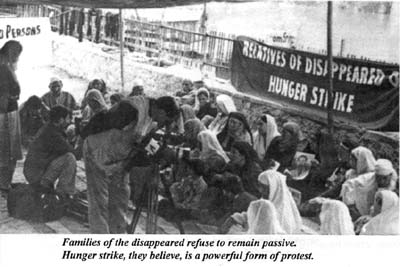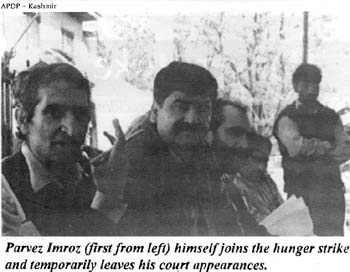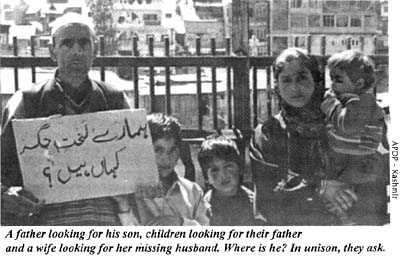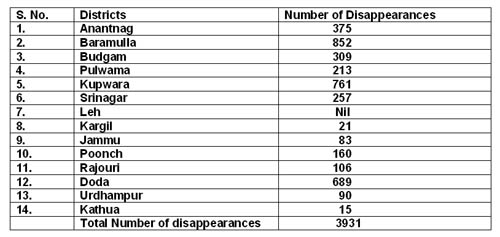|
Cover
Table of Contents
Editorial
- Strengthening AFAD’s Unity…
Cover Story
- Years of Trials and Triumphs…
Country Situations
- NO political reform, NO hope for justice…
- Hunger Strike
- Indonesian Human Rights Movement…
- Crime and Punishment
- Anti-enforced Disappearance Bill
Human Interest
- A Life That is Never The Same Again
Photo Essay
- Kashmiri families of missing person stage…
Book Review
- Disappearances in Sri Lanka
Report on International Lobbying
- A Narrative of Contrast
Features
- Where are They?
- Working Towards an African Network
- Reduced to Ashes: The Insurgency…
News Brief
Mid Year Report
Prayer
|
COUNTRY SITUATION
KASHMIR, INDIA
Hunger Strike
by the relatives of desaparecidos
from 17th to 24th of April 2003
by Atty. Parvez Imroz1
 The Association of Parents and Disappeared Persons launched a week-long hunger strike from 17th to 24th April 2003. It was a courageous step of the relatives of victims of the human rights violations in Kashmir. The two -month notice of hunger strike was given to the government after making certain demands. The major demand was the stopping of enforced disappearances, which are continuing unabatedly. Earlier the victims conducted a signature campaign in which more than 2,000 relatives appended their signatures including the signatures from
The Association of Parents and Disappeared Persons launched a week-long hunger strike from 17th to 24th April 2003. It was a courageous step of the relatives of victims of the human rights violations in Kashmir. The two -month notice of hunger strike was given to the government after making certain demands. The major demand was the stopping of enforced disappearances, which are continuing unabatedly. Earlier the victims conducted a signature campaign in which more than 2,000 relatives appended their signatures including the signatures from
 Amnesty International members and civil society groups, which were later sent to international human rights institutions and organizations. This signature campaign was joined by human rights groups from different countries including European and Asian countries. A copy was forwarded to the authorities highlighting their demands. Amnesty International members and civil society groups, which were later sent to international human rights institutions and organizations. This signature campaign was joined by human rights groups from different countries including European and Asian countries. A copy was forwarded to the authorities highlighting their demands.
The relatives are struggling on the individual as well as collective levels to know the fate of their beloved ones, but the government is reluctant to acknowledge the plight of the relatives and in accepting the demands of the association made from time to time and on different occasions. It seems that the state and federal governments are helpless under the prevailing circumstances to address the problem, which they believe will demoralize the army and embarrass them before the international community.
Since 1989, different regimes have taken over the reigns of the state. Since 1986, two civilian governments have been at the helm of affairs but nothing on ground has changed. The present government has made human rights an election platform and according to the Common Minimum Programme (CMP), promised people that human rights violations would be stopped at any cost and the perpetrators would be punished according to law. Notwithstanding the election rhetoric, disappearances continue unabated. Since 2nd November 2002, when the new government took over, there have been 46 cases of disappearances from different parts of the state, which have been brought to the notice of the state government. It is customary that every new government blames previous governments for disappearances and practically all the governments have shown indifference, callousness and helplessness under the prevailing circumstances to address the issue confronting more than two hundred thousand relatives of
desaparecidos. Although, the politicians and bureaucrats have informally expressed serious concerns over the alarming number of missing persons, they have also expressed their helplessness.
There has been no remedial measure from the government. As far back as 1999, the home department issued a circular in continuation of Government Order No. GON 723-GR-GAD of 1990 dated 10-07-1990 read with Government Order NO. 1073-GR of 1990 dated 19-11-1990 for the constitution of a District-Screening-Cum- Coordination Committee in each district, which would recommend cases of missing persons for payment of
ex-gratia relief. The Committee, along with other persons, was to be comprised of representatives of the very perpetrators (security forces). Since the issuance of the circular, this so-called District-Screening-Cum-Coordination Committee has seldom met. The association has no faith in this committee composed of the very perpetrators.
The hunger strike by the victims of injustice resorted to different forms of protests such as picketing, self-immolations etc, which are a normal feature of society. It is one of the proactive modes of protest.
In Kashmir, the relatives of the disappeared were forced to act . Nevertheless, most of the victims are illiterate and belong to the disempowered and dispossessed sectors of society. They know least about the international human rights law, UN Charter or covenants signed by the Indian Government. The relatives have been protesting against the unabated disappearances and the families have always wanted to know the whereabouts of their dear ones. It has been generally believed that they have been eliminated under the cover of impunity. The state government, being part of the Indian system and the institutions of state including the judiciary, being part of the Indian political system, has not shown resilience to their obdurate policy. Injustice happens because of the failure of the judiciary system which is supposedly meant to protect life and liberty of the citizen, thus confounding the perception that repression is systematic and institutional. There are two ways to force the government. One is that there should be strong and organized protests by the victims of state repression, which will take considerable time because the victims are illiterate and are accepting injustice as fait
accompli. They need to be educated about their rights. It is a long-drawn out process, which may finally culminate into anger, which is a normal part of any healthy society. The other option is to mount external pressures in an atmosphere of globalization where globalizing responsibilities are part of the system . The pressure from different governments is unlikely because governments now behave like business communities and deal with each other on the basis of “pragmatism” rather than on principles.
It has been observed that governments have become too insensitive to these peaceful and non-violent protestors. Though, they have developed immunity to these protests, it still leaves an impact on them.
 The APDP, since its formation in 1994, has been campaigning against enforced or involuntary disappearances in Jammu and Kashmir State. The association, from time to time, highlighted the plight of victims but the government remains indifferent . In the month of January, the association gave a two-month notice to the state government for considering their demands, which government has not responded to.
The APDP, since its formation in 1994, has been campaigning against enforced or involuntary disappearances in Jammu and Kashmir State. The association, from time to time, highlighted the plight of victims but the government remains indifferent . In the month of January, the association gave a two-month notice to the state government for considering their demands, which government has not responded to.
The disappearances were never a part of Kashmir, but since 1989, when armed conflict began in Kashmir, more than 8,000 people have disappeared after their arrest by the law enforcing agencies. Majority of them are non-combatant Kashmiris. Even the government has admitted the phenomenon, albeit in different versions from time to time. The new Chief Minister of Jammu and Kashmir state, Mufti Muhammad Syed on February 25, 2003, revealed what the security agencies had been doing in 2000, 2001 and 2002. Mufti informed the State Assembly in Jammu that “3,744 persons are missing between 2000 to 2002. 1,553 persons disappeared in 2000. 1,586 reported missing in 2001 and 605 in 2002.” Earlier, on July 18, 2002, the then Home Minister Khalid Najeeb Soharwardy of the erstwhile National Conference government also admitted on the floor of the Legislative Assembly that 3,184 persons have been missing in the Valley since the inception of militancy. The Law Minister of his regime stated on 25th of March that since 1992 December, 3,744 have been reported missing of whom 135 have been declared dead up to June 2002. The investigations and number of disappearances could be even more recently. The government has revealed a new figure of 3, 931. These figures are preliminary and one can estimate the numbers of total disappearances in view of the figures furnished by the government.
Here below is the list recently issued by the government regarding the disappearances from different parts of the state in the state legislative assembly.

As far back as year 2000, the Divisional Commissioner issued a public notice in local papers directing the relatives of the missing persons to approach the respective deputy commissioners along with details of the missing persons. The relatives, by the thousands, with hope and expectations, filed the details in the office of the respective Deputy Commissioners but now , no one knows the fate of these petitions.
In 2002, the association conducted a signature campaign, in which thousands of relatives (though illiterate) signed the petition.
The hunger strike was very successful in which hundreds of relatives of disappeared persons from different parts of the Kashmir valley participated. It has inspired the victims of other forms of human rights violations and has set a trend. There was a one-day boycott call on the visit of the Prime Minister (PM) of India, Mr. Atal Behari Vajpayee to Kashmir, which disrupted transport, thus making it impossible for the relatives of disappeared persons who were coming from the different districts to join. The relatives from each district, according to the programme, sat on the hunger strike. It was an occasion of sharing their grief and expressing solidarity with each other. The notice of the hunger strike was made public so that many relatives who had not earlier reported or had no knowledge of the association were able to join the strike. The hunger strike coincided with the PM’s visit, which further raised the eyebrows of the intelligence agencies. Since the huge number of national and international media came to cover the PM’s visit, they also widely covered the hunger strike, thus making it more effective. One of the most deplorable and shocking things during the hunger strike was the statement made by the Chief Minister (CM), Mufti Mohammed Syed during the press conference of the PM, when a reputed journalist from British Broadcasting Corporation (BBC) drew the latter’s attention towards the victims of involuntary disappearances . The PM referred the question to the CM. The CM gave a vague reply in which he said only 60 persons have disappeared and the rest have crossed the line of actual control (LOAC). His own statement was in contradiction to his own statement made on 26th of February 2003, in State Legislative Assembly and the statement made by his Law Minister on 25th of March in which he admitted that 3,744 cases of disappearances have been recorded and the number could be even higher.
The most encouraging thing for the relatives on hunger strike was the solidarity extended to them by the member-organizations of the Asian Federation Against Involuntary Disappearances, particularly the two separate sit-ins organized by
KontraS / IKOHI in Indonesia before the Indian High Commission and by the Tiananmen Mothers’ Campaign before the Indian Consulate General in Hong
Kong. The victims’ families were elated on seeing the emailed protesting photographs of
KontraS / Ikohi outside the Indian High Commission. This support was incredible, and has rejuvenated the civil society groups in Kashmir. Earlier, only the politicians had highlighted the human rights violations in Kashmir. The hunger strike caused embarrassment to the Indian government, particularly the state government forcing the National Human Rights Commission to take action. Taking serious note on 14th of May 2003, of the “vexed issue” of disappearances, Chairman A. S. Anand, in its full commission meeting, asked the state chief secretary to submit information within six weeks after which “it shall consider such further steps as it may need to take actions in respect of this matter.”
Among other things, the commission has asked the state government to inform whether it has established a system to record allegations of enforced or involuntary disappearances and, if so, the nature of that system, the number of such allegations recorded by it, the detail the systems established to investigate such allegations and the results, thus far, of such investigations.
It also asked about the measures that were being taken to prevent the occurrence of such disappearances, steps taken to book those who may have been involved in the cases and to provide justice to those who have suffered.
The commission, which had taken suo moto cognizance of the matter in 2000, and since then, kept in touch with the state government, said, “in such circumstances, and in order to proceed with the maximum care and coherence on this vexed issue,” it considers that, at this stage, the information should be asked by the state chief secretary. A copy was also sent to the defense and home ministry. The victims do not have much expectations from the state institutions because it is the failure of these very institutions or their acquiescence , which has resulted in large number of enforced disappearances.
This hunger strike was the first such move ever taken by the victims of human rights violations. The major outcome of which was that it was widely covered by the local and Indian press. Many people, particularly the civil society, were involved in the issue of disappearances in Kashmir and a systematic campaign was also carried by the local media. The documentary prepared on the
desaparecidos was released shortly after the hunger strike in which the plight of the families of the disappeared persons was highlighted, which triggered a debate in society. Due to the efforts made by the APDP, the issue of disappearance has become the major issue in Kashmir. Even as recently, on 21st of June, the government admitted the number of enforced disappearance as 3,931 persons. Still, there are many miles to go. Not much is expected from the government- controlled National Human Rights Commission which has already disappointed the relatives in 2000, after observing the International Day of Disappeared on August 30 of the same year. Only the solidarity of the groups working outside India can pressurize the government because only external pressure is likely to be workable and effective in their behalf. A strong lobbying with the Association of the South East Asian Nations and South Asian Association for Regional Cooperation (SAARC) countries is needed.

1Atty. Parvez Imroz is a human rights lawyer and a member of the Bar in the state of Jammu and Kashmir (JK), India. He also handles cases of involuntary disappearances. Atty. Imroz is the patron of the Association of Parents of Disappeared Persons in Jammu and Kashmir, India and is the president of the JK Coalition of Civil Society.
VOICE September 2003
|